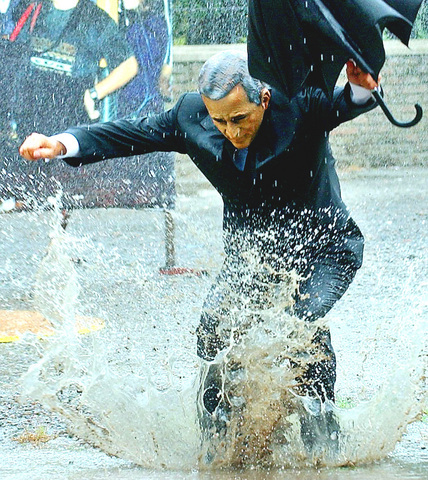The European Union charged that Washington has blocked efforts to move global warming discussions past 2012, as 12 days of marathon UN negotiations with 5,000 delegates from around the world came to an end on Friday.
The EU wanted the nations that signed the Kyoto Protocol on climate change -- including the US, which has since rejected the treaty -- to negotiate on a multilateral basis and schedule talks for next year on reducing gas emissions after 2012, when the Kyoto agreement expires.

PHOTO: AP
But Pieter van Geel, the environmental secretary for the Netherlands, which now holds the EU presidency, said he was disappointed by the results.
"I'm not optimistic," van Geel told reporters in an interview. "The US knows this is the first step toward discussing climate change, and they are very reluctant to do it under the UN."
EU representatives spearheaded a huge Old World effort in the fight against global warming. But in the end, the US, which produces nearly a quarter of the world's greenhouse gasses that are blamed for a global temperature rise, turned a deaf ear to European pleas.
"We have not managed to even push open the gate to the political future of the climate," said a German negotiator, Karsten Sach.
Negotiators from China, India and Brazil backed Washington's efforts to block talks on post-2012 emissions, charging that the world's richest nations -- which have produced most of the pollutants -- still had not done enough to lower their emissions.
Argentine President Nestor Kirchner noted that many developing countries suffer from heavy debt burdens and are limited in their ability to respond to the environmental threat. Developed countries are always demanding financial debts be paid back, but they are not willing to own up to their own environmental debts to the world.
"This double morality is unacceptable," Kirchner said.
The EU and other industrial countries like Canada and Japan were optimistic, however, because the Kyoto Protocol will go into effect on Feb. 16 despite the US' opposition. Russia's ratification this year passed the necessary threshold for the treaty to kick in.

MAKING WAVES: China’s maritime militia could become a nontraditional threat in war, clogging up shipping lanes to prevent US or Japanese intervention, a report said About 1,900 Chinese ships flying flags of convenience and fishing vessels that participated in China’s military exercises around Taiwan last month and in January have been listed for monitoring, Coast Guard Administration (CGA) Deputy Director-General Hsieh Ching-chin (謝慶欽) said yesterday. Following amendments to the Commercial Port Act (商港法) and the Law of Ships (船舶法) last month, the CGA can designate possible berthing areas or deny ports of call for vessels suspected of loitering around areas where undersea cables can be accessed, Oceans Affairs Council Minister Kuan Bi-ling (管碧玲) said. The list of suspected ships, originally 300, had risen to about 1,900 as

Right-wing political scientist Laura Fernandez on Sunday won Costa Rica’s presidential election by a landslide, after promising to crack down on rising violence linked to the cocaine trade. Fernandez’s nearest rival, economist Alvaro Ramos, conceded defeat as results showed the ruling party far exceeding the threshold of 40 percent needed to avoid a runoff. With 94 percent of polling stations counted, the political heir of outgoing Costa Rican President Rodrigo Chaves had captured 48.3 percent of the vote compared with Ramos’ 33.4 percent, the Supreme Electoral Tribunal said. As soon as the first results were announced, members of Fernandez’s Sovereign People’s Party

MORE RESPONSIBILITY: Draftees would be expected to fight alongside professional soldiers, likely requiring the transformation of some training brigades into combat units The armed forces are to start incorporating new conscripts into combined arms brigades this year to enhance combat readiness, the Executive Yuan’s latest policy report said. The new policy would affect Taiwanese men entering the military for their compulsory service, which was extended to one year under reforms by then-president Tsai Ing-wen (蔡英文) in 2022. The conscripts would be trained to operate machine guns, uncrewed aerial vehicles, anti-tank guided missile launchers and Stinger air defense systems, the report said, adding that the basic training would be lengthened to eight weeks. After basic training, conscripts would be sorted into infantry battalions that would take

GROWING AMBITIONS: The scale and tempo of the operations show that the Strait has become the core theater for China to expand its security interests, the report said Chinese military aircraft incursions around Taiwan have surged nearly 15-fold over the past five years, according to a report released yesterday by the Democratic Progressive Party’s (DPP) Department of China Affairs. Sorties in the Taiwan Strait were previously irregular, totaling 380 in 2020, but have since evolved into routine operations, the report showed. “This demonstrates that the Taiwan Strait has become both the starting point and testing ground for Beijing’s expansionist ambitions,” it said. Driven by military expansionism, China is systematically pursuing actions aimed at altering the regional “status quo,” the department said, adding that Taiwan represents the most critical link in China’s